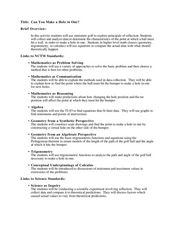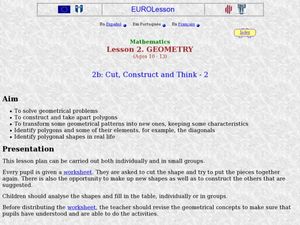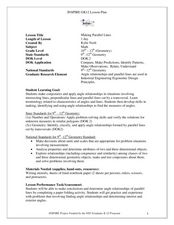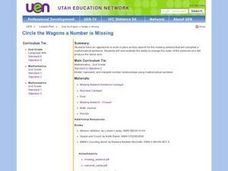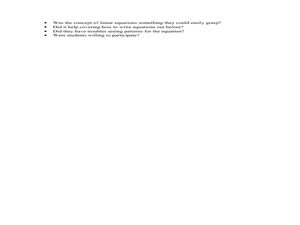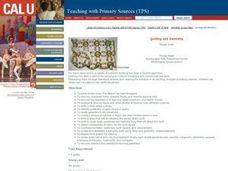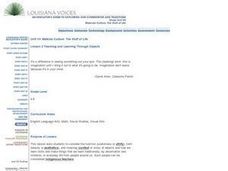Curated OER
Symmetry that is Basic and Beautiful
Students explore lines of symmetry. In this symmetry lesson, students divide and combine shapes along basic lines of symmetry. Students explore symmetry in real life objects.
Curated OER
Can You Make a Hole in One?
Students relate miniature golf to reflection of an image. In this algebra lesson, students collect and graph data as they study linear equations. They apply properties of graphing to solve real life scenarios.
Curated OER
Geometry: Cut, Construct and Think
Students explore polygons. In this geometry skills lesson, students complete an activity that requires them to solve geometry problems that involve polygons as they piece together geometric shapes. Students analyze the shapes they create...
Curated OER
Making Parallel Lines
Students differentiate between parallel and perpendicular lines. In this geometry lesson, students make conjectures and apply it to solve real life situations. They collect data and make predictions based on the data.
Curated OER
Cost and Revenues
Students develop the key concepts of total, variable, fixed, average and marginal costs. The theory of using different business scenarios is applied to different situations for an extension to real life application.
Curated OER
Circle the Wagons a Number is Missing
Second graders have an opportunity to work in pairs as they search for the missing addend to complete a mathematical sentence. They identify and demonstrate the ability to change the order of the addends and still produce the same sum....
Curated OER
Every Graph Tells A Story
Seventh graders explore linear equations. In this graphing lesson, 7th graders explore constant rates of change. Students discover the real-life application of graphs and demonstrate their ability to read graphs and write corresponding...
Curated OER
Patterns
Students identify patterns in equations. In this algebra lesson, students write equations of problems with recurring patterns. They relate and model real life situation using functions.
Curated OER
Mazes and Labyrinths
Students evaluate directions by participating in a maze activity. In this labyrinth lesson, students identify the history of mazes and labyrinths and utilize Google Earth to examine real life mazes. Students create their own mazes...
Curated OER
Choices
This unit is about making calculations in the real life situations of taxis, hire cars, and cell phones. They find and justify a word formula which represents a given practical situation. Solve simple linear equations such as 2? + 4 = 16.
Curated OER
Exploring the Beach
Students explore the beach. In this marine habitat instructional activity, students inspect sand grains, design beach profiles, classify marine life, and examine natural beach habitats. Students use spreadsheets to record data from their...
Curated OER
Last Will and Testament of Amanda Hugandkiss
Eleventh graders apply mathematical knowledge and reasoning skills to solve a real life problem. In this algebra lesson, 11th graders use a variety of problem solving skills to solve non-routine problems of increasing difficulty. The...
Curated OER
Functions and Graphing
Graphing functions in a real world application makes math come to life. Learners graph points on a coordinate plane and identify various points on a graph by working through a set of real world problems. This is a perfect review exercise.
Curated OER
Getting It Right!
Students construct right triangles, measuring the sides and recording the measurements in spreadsheets. They analyze their measurements for patterns and research the Internet for information on Pythagoras.
Curated OER
Hopper Hunt: IPM Decision-making in Alfalfa
Learners describe migrations and life cycle pattersn of a key alfalfa pest, the Porato Leafhopper. They define the Economic Inquiry Level and Economic Threshold. Students evaluate data in relation to profit as it applies to IPM. They...
Curated OER
Help! I Need Five Minutes to Study
Students learn to use a time grid or a calendar to increase productivity of their studying. In this studying lesson, students record how they spend their studying time and then adjust as needed. Students recognize various ways to...
Curated OER
The Seed Connection
Second graders investigate the best conditions for growing plants while considering how math, science, and technology are interrelated in this study. They partner with an upper grade through the use of the Internet and conduct a...
Curated OER
Crispy Cookie Class Fundraiser
Seventh graders see the relationship of math and the real world application by manufacturing a product for making a profit. They create a food product from a recipe, record their sales and analyze and report their gross profit.
Curated OER
Geometry and Quilting
Students create a quilt square for a class quilt using at least three, two-dimensional geometric figures. They research and write a brief description of at least two different quilt patterns that they find. Pupils discuss that quilts are...
Curated OER
Mean, Median, and Mode
Students find the mean, median, and mode for a set of data. They define terms and find examples, as well as complete practice exercises. They work cooperatively to analyze real data from a variety of websites provided. To...
Curated OER
Our World of shapes
First graders listen to Shapes and The Greedy Triangle to identify and describe examples of geometric shapes. In this geometric shapes lesson, look for geometric shapes in real world places. Students make a mobile of shapes in the real...
Curated OER
Teaching and Learning Through Objects
Students identify and interpret the function, usefulness or utitlity, form, beauty or aesthetics, and meaning, context or story, of objects and how they learn new skills and make things that they learn traditionally, by observation and...
Curated OER
Percents: What's the Use
Learners research percentages in real world situations. In this percents lesson, students demonstrate their ability to apply percents to everyday situations. Learners communicate mathematically by conducting interviews about percents and...
Curated OER
Ratios, Mars and the Internet
Students calculate real ratios that exist between the planets Earth and Mars. After a lecture/demo, students use worksheets and access Internet sites to do their calculations.



